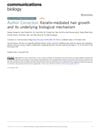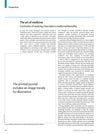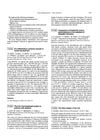29 citations,
July 2011 in “Pediatrics in review” Accurate assessment of puberty using Tanner staging is crucial for identifying normal and abnormal development.
 1 citations,
January 2023 in “Revista Da Associacao Medica Brasileira”
1 citations,
January 2023 in “Revista Da Associacao Medica Brasileira” People with seborrheic dermatitis often have lower vitamin D levels.
 August 2023 in “MOJ women's health”
August 2023 in “MOJ women's health” Brown Adipose Tissue (BAT) could potentially treat Polycystic Ovary Syndrome (PCOS) by controlling energy balance and lipid homeostasis, but more human research is needed.
December 2021 in “Pathologica” Trichogerminoma is a rare, benign skin tumor from hair cells, with a small risk of becoming cancerous.
99 citations,
April 1998 in “The journal of investigative dermatology/Journal of investigative dermatology” Hair follicles help skin immune recovery after UVB exposure.
 4 citations,
May 2012 in “Tissue Engineering and Regenerative Medicine”
4 citations,
May 2012 in “Tissue Engineering and Regenerative Medicine” Scientists created three types of structures to help regrow hair follicles, and all showed promising results for hair regeneration.
 December 2022 in “Communications biology”
December 2022 in “Communications biology”  9 citations,
May 2012 in “Journal of Craniofacial Surgery”
9 citations,
May 2012 in “Journal of Craniofacial Surgery” Submental tissue is good for repairing mouth area skin with minimal scarring and good cosmetic results.
 22 citations,
October 2019 in “International Journal of Nanomedicine”
22 citations,
October 2019 in “International Journal of Nanomedicine” The nanoparticles improved hair growth and enlarged hair bulbs.
 April 2012 in “The Journal of Urology”
April 2012 in “The Journal of Urology” More prostate biopsies increase the chance of finding cancers that may not need treatment.
May 2014 in “Hanbang an'i'bi'in'hu pibu'gwa haghoeji” Low-level laser therapy is effective and safe for treating hair loss.
 January 2009 in “Elsevier eBooks”
January 2009 in “Elsevier eBooks” Some plant-based treatments may help with ovary function, insulin resistance, and excess male hormones in PCOS, but more research is needed to confirm their safety and effectiveness.
 199 citations,
April 2010 in “Nature”
199 citations,
April 2010 in “Nature” A gene called APCDD1, which controls hair growth, is found to be faulty in a type of hair loss called hereditary hypotrichosis simplex.
135 citations,
October 1997 in “Journal of biological chemistry/The Journal of biological chemistry” Trichohyalin is modified by enzymes to form strong structures in hair cells.
 January 2001 in “Cambridge University Press eBooks”
January 2001 in “Cambridge University Press eBooks” Early signs of PCOS in girls, like irregular periods and polycystic ovaries, suggest a need for early diagnosis and intervention to prevent further health issues.
 52 citations,
October 2010 in “Antiviral Therapy”
52 citations,
October 2010 in “Antiviral Therapy” New treatments for Hepatitis C show promise but need more research to confirm their safety and effectiveness for clinical use.
 11 citations,
July 2010 in “The Lancet”
11 citations,
July 2010 in “The Lancet” Chocolate has been historically used for medicinal purposes, with current research focusing on heart health benefits, but the extent of these benefits is debated.
 9 citations,
September 2009 in “The Prostate”
9 citations,
September 2009 in “The Prostate” Finasteride doesn't improve survival in LNCaP tumor model during off-cycle of therapy.
 10 citations,
May 2018 in “Nutrition and Cancer”
10 citations,
May 2018 in “Nutrition and Cancer” Certain spices may help prevent and treat skin cancer, but more human trials are needed.
 April 2024 in “Journal of cancer research and clinical oncology”
April 2024 in “Journal of cancer research and clinical oncology” Tissue-derived extracellular vesicles are crucial for cancer diagnosis, prognosis, and treatment.
 51 citations,
May 2013 in “The Journal of Steroid Biochemistry and Molecular Biology”
51 citations,
May 2013 in “The Journal of Steroid Biochemistry and Molecular Biology” Certain drugs that block specific enzymes can help treat prostate diseases.
 21 citations,
August 2014 in “Gynecological Endocrinology”
21 citations,
August 2014 in “Gynecological Endocrinology” Higher hs-CRP levels in Indian adolescent women with PCOS are more related to BMI than PCOS itself.
 10 citations,
October 2015 in “Medicina Clínica (english Edition)”
10 citations,
October 2015 in “Medicina Clínica (english Edition)” Recombinant human epidermal growth factor is versatile, effective, and safe for long-term skin and mucosal treatments.
 41 citations,
May 2018 in “Nutrition and healthy aging”
41 citations,
May 2018 in “Nutrition and healthy aging” Skin aging is largely due to differences in stiffness and elasticity between skin layers, leading to wrinkles.
 15 citations,
August 1998 in “Australasian journal of dermatology”
15 citations,
August 1998 in “Australasian journal of dermatology” The document concludes that various cosmetic and drug treatments are available for hirsutism, and some new drugs show promise.
 431 citations,
October 2008 in “Current Medicinal Chemistry”
431 citations,
October 2008 in “Current Medicinal Chemistry” Coumarin derivatives show promise as anti-estrogenic agents for treating breast cancer, with some in clinical trials.
 66 citations,
June 2018 in “International Journal of Women's Dermatology”
66 citations,
June 2018 in “International Journal of Women's Dermatology” No cure for female pattern hair loss, but various effective treatments exist.
 14 citations,
September 2018 in “International Journal of Molecular Sciences”
14 citations,
September 2018 in “International Journal of Molecular Sciences” Mackerel-derived fermented fish oil helps hair grow by activating growth pathways and increasing cell proliferation.
 1 citations,
December 2021 in “Tropical Journal of Pharmaceutical Research”
1 citations,
December 2021 in “Tropical Journal of Pharmaceutical Research” Kanglaite injection with chemotherapy improves treatment and reduces side effects for advanced lung cancer.
 September 1997 in “JEADV. Journal of the European Academy of Dermatology and Venereology/Journal of the European Academy of Dermatology and Venereology”
September 1997 in “JEADV. Journal of the European Academy of Dermatology and Venereology/Journal of the European Academy of Dermatology and Venereology” Alopecia patients have a less active liver monoxygenase system, which can be treated with photochemotherapy and system inducers.
























